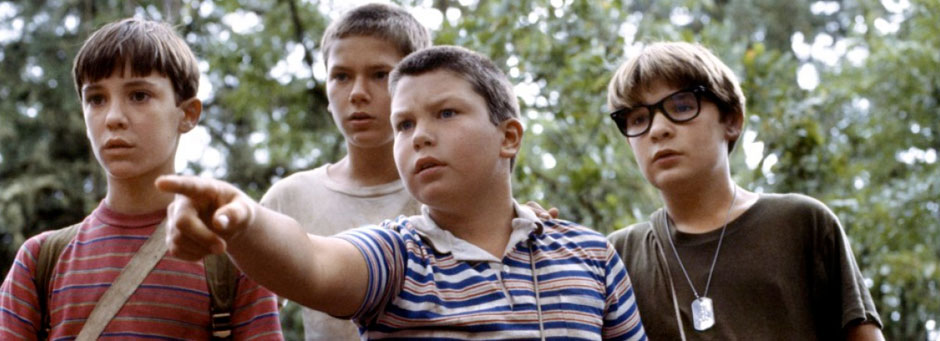Review: Stand by Me (1986)
I never watched Stand by Me when I was growing up. So when I finally watched Rob Reiner’s adaptation of Stephen King’s coming-of-age story the other night, I was struck by the film’s delicate handling of conventional genre elements. This is really good, I thought.
Like King’s other non-horror stories that have been adapted to film, namely The Shawshank Redemption and The Green Mile, Stand by Me is soaked through with feelings of nostalgia. Much of this owes to the narration. Like Shawshank or The Green Mile, the events in Stand by Me are related in voice-over by a character, now much older, looking back on a period of his life.
In Stand by Me, that period is specifically Labour Day weekend in 1959 in the small Oregon town of Castle Rock and its surrounding countryside. As the film begins, we meet an adult Gordon Lachance (played by Richard Dreyfuss) who begins to reminisce about his boyhood after seeing a newspaper article about the violent death of a lawyer he seems to have known back then. The majority of the film is an extended flashback recounting the events of that weekend and the friends of his youth. Gordon was Gordie back then, and his friends were Chris, Teddy, and Vern.
Gordon’s first line of narration is a great one, and sets up the film’s uniqueness: “I was twelve going on thirteen the first time I saw a dead human being.” While the film covers many familiar subjects of the male-centred coming-of-age story—conflict with parents, brotherhood, getting into mischief with friends, etc.—the central event of the story is peculiar: four boys on the cusp of junior high set out to see the body of a dead boy who went missing in the woods. The quest begins when Vern overhears his older brother and a friend talking about coming across the body in the woods, when they were out after a joy ride. When Vern tells the gang, they decide to set out and find the body, hoping to get famous from the discovery. At the same time, Vern’s older brother’s tells his greaser friends, and their gang sets out too. The older gang presents the chief external threat to the boys, although there’s a run-in with a junkyard dog as well. While this central premise highlights the immature morbidity of young boys, the film also addresses the deeper, darker aspects of many childhoods.
Gordie (played by Wil Wheaton, that is Wesley Crusher before he was Wesley) is a sensitive boy who enjoys telling stories, but his parents don’t show him much attention or affection after the death of his older, football-star brother (John Cusack). His friend Chris (River Phoenix) comes from the local “trouble” family, and he feels trapped in the role of the “bad kid” who won’t amount to anything. Teddy (Corey Feldman) sports thick rims, is hyperactive and overly-talkative, and has problems with authority; we’re told his mentally-ill father held his ear to the stove. And then there’s Vern (Jerry O’Connell), the chubby, earnest dweeb who is the butt of most of the group’s jokes.
While the four boys tease, bicker, and fight like most boys, Reiner captures a physical fondness alongside the verbal aggression. Both the name-calling and the arms-over-shoulders affection seem real to a degree that only a few recent films I can think of, such as Super 8, seem capable of achieving. Another reason for this is that the child actors all deliver exceptional performances, River Phoenix in particular. The depth of feeling that the performances generate makes the film genuinely touching.
The ending is also uniquely delicate, for both its willingness to not expand beyond the aims and means of the story, nor to exaggerate conflict for the sake of emotional highs. In this respect, the final standoff between the four boys and older gang is welcomely understated. I know the film is based on a novella, but I would say the film achieves the precision and focused scope of an excellent short story.
I want to add that I was also surprised by the film’s R-rating. King’s name must have had enough clout in the mid-1980s, because the only other non-tragic R-rated film about a boy growing up I can think of is Boyhood. Sure, the rating is mostly for language, but it allows the kids to actually use the full range of the school yard’s diction.
In spite of the R-rating though, I would expect the film is able to connect with a wide range of audiences. There’s honest, childish fun (I’m thinking of the puking story especially), sensitively explored serious subject matter, and great acting. This movie should work for boys and girls, teenagers, and adults. There’s a lot there, above as well as below the surface.
This is a coming of age story to remember.
8 out of 10
Stand by Me (1986, USA)
Directed by Rob Reiner; screenplay by Raynold Gideon & Bruce A. Evans based on the novella by Stephen King; starring Wil Wheaton, River Phoenix, Corey Feldman, Jerry O’Connell, Kiefer Sutherland, Casey Siemaszko, Gary Riley, Bradley Gregg, Jason Oliver, John Cusack, and Richard Dreyfuss.
